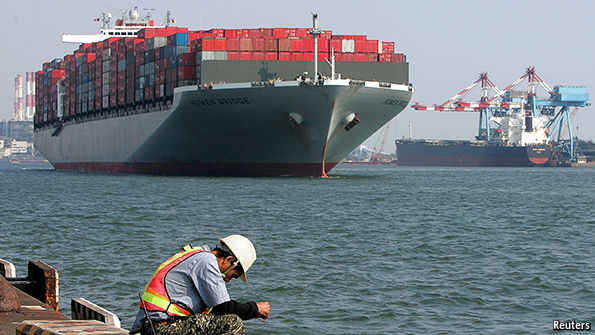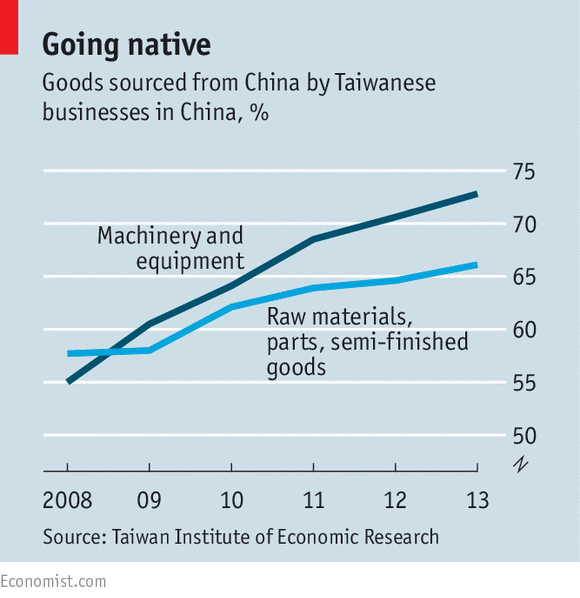Taiwan’s economy
Straitened circumstances
Weaker growth exposes the downside of ties with China

THE Chinese theory about economic integration with Taiwan is that it will bind the two together politically. Taiwan will become ever more reliant on China for its prosperity, paving the way to eventual unification. Many in Taiwan fear this process is under way. But now the premise of the theory—that closer ties with China are essential for growth—is being tested by a sharp economic slowdown in Taiwan.
Over his nearly eight years in office, Ma Ying-jeou, Taiwan’s president, has pushed for a detente with China. A flurry of deals, including a limited free-trade agreement, has fuelled business ties. Taiwanese exports to China have soared, as has Chinese investment in Taiwan. A recent meeting between Mr Ma and Xi Jinping, China’s president, in Singapore—the first between leaders of the two countries—was meant to show the promise of more co-operation.
Awkwardly, though, Taiwan’s economy is in a slump. GDP shrank by 1% year on year in the third quarter, its first contraction since 2009. Last year Taiwan grew by 3.8%. Many analysts had expected about the same this year. Instead, it will do well to hit 1%, says Gordon Sun of the Taiwan Institute of Economic Research. The global slowdown in trade is partly to blame. Exports are the lifeblood of Taiwan’s economy, accounting for nearly three-quarters of its output. Yet other export-driven economies in Asia such as South Korea and Singapore are not suffering as much.
The benefits from Taiwan’s rapprochement with China appear to be topping out. Taiwan’s trade surplus with China was 18% smaller in the first nine months of this year than in the same period in 2014. Chinese investment is down by nearly two-thirds from a year earlier. Even Chinese tourists, still flocking to Europe and other parts of Asia, are showing less interest in Taiwan: visitor numbers are up by just 5% this year.
One interpretation is that Taiwan is simply a victim of China’s slowing growth. But there is widespread concern that something deeper is at work: that Taiwan is losing ground to China and ill-equipped to fight back. So prevalent is this view that Taiwanese routinely refer to the threat from Chinese firms as the “red supply chain”.
Until a few years ago, the economic relationship between China and Taiwan was symbiotic. Taiwanese firms, among the world’s biggest makers of electronic components, needed China’s cheap labour; China craved Taiwan’s technical know-how. But this complementarity has given way to competition. Chinese producers of petrochemicals, steel, computers and digital displays have moved into terrain once occupied by Taiwan. Taiwanese firms with operations in China are themselves buying more materials and machinery from Chinese suppliers. Chinese firms are now trying to break into semiconductors, Taiwan’s last big industrial redoubt.

The structural challenge does not come from China alone. Taiwan’s greatest strength is in making parts for computers and mobile phones. But the global markets for both are increasingly saturated. Short of a new consumer craze—some firms pin their hopes on wearables or 3D printers—the hardware industry’s future looks bleak.
For an export-led economy like Taiwan to reinvent itself, it needs to stay immersed in global trade. Here, though, it faces the cold reality of its geopolitical ostracism. Absent China’s express approval, other countries are reluctant to engage in free-trade talks with Taiwan. Yet Japan, South Korea and China—Taiwan’s main competitors—are signing lots of their own deals.
The easiest answer would be for Taiwan to open itself yet wider to trade with China. Politically, though, this is a non-starter. Taiwanese students last year occupied the parliament to protest against a services trade deal with China.
Tsai Ing-wen, Mr Ma’s likely successor , is determined to tilt Taiwan away from China. She wants to foster closer links with South-East Asia and to bring Taiwan into the Trans-Pacific Partnership, an American-led free-trade deal that covers 40% of the global economy but excludes China (see article). It will be very hard for Taiwan to escape China’s economic orbit. If Ms Tsai gets her way, it will not be for lack of trying.

No comments:
Post a Comment